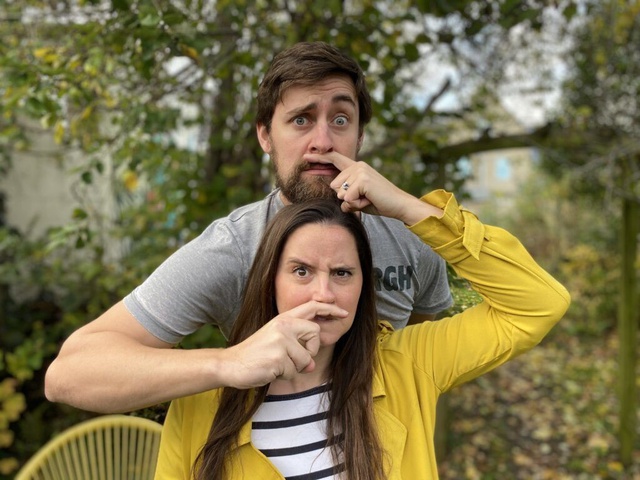From Small Casts to Podcasts: Advice from New Old Friends
15.06.21
With lockdown stopping live performance we spoke to New Old Friends about how they've used podcasting to reach new listeners and polish their writing style whilst also keeping audiences entertained with their witty wordplay, hilarious characters and fiendishly clever plots.
Podcasting doesn't have to just be factual or personal tales, there's a lot of space for fictional narratives and audio dramas too.
Given that their recent offering Crimes On Centre Court has followed in the footsteps of Crimes Against Christmas and landed inside the Top 100 fiction podcasts Feargus and Heather certainly seem well qualified to talk us through what they've learned.
Hi everyone have you heard about the exciting new medium of podcasting? Probably not, it’s pretty niche. Oh, you have? Of course you have! Everyone and their dog launched a podcast during lockdown (we’re not kidding there are at least 25 podcasts featuring actual dogs). But most podcasts are people talking (or barking) into microphones about a given subject. However, there is a growing audience for fictional narrative. Stories being told with just audio, and characters being played by actors. Some big players have got in on the act recently; Rami Malek, Rosamund Pike, Brian Cox, Tessa Thompson and many others star in narrative fiction podcasts. Even Marvel have released one.
Our little self-produced series, Comedy Whodunnits For Your Ears, has carved out a dedicated audience and just completed its third standalone series. When we’re releasing new episodes we’re a fixture in the Top 100 Fiction chart and have been as high as number 2 which was exciting and even got us inside the Top 200 overall podcasts on iTunes for a while. Not bad for a team of three with no audio drama experience to start with, recording in our spare room. So how did we do it?
Here begins the advice:
Find yourself a sound engineer/designer/composer/wizard like Fred Riding.
Without Fred the show would be just the two of us doing silly voices. Entertaining maybe, but not the level of polish Fred has brought.
Get a good microphone.
We bought a RODE under Fred’s advice, it cost somewhere in the £100 range. But buy the best you can afford, there are cheaper mics range available that Fred said would also work well.
Cover the area you’re recording in soft furnishings.
Pillows, blankets, rugs etc. It does something to the sound, or maybe Fred just enjoys making us make dens.
We use Audacity, a free piece of software, to record.
We send files of just our voices to Fred who cleans them up, adds all manner of glorious sound, music and metadata.
We’re hosted on Anchor, owned by Spotify.
Spotify are desperate to try and claim a share of the Apple dominated podcast market, so they currently offer totally free, totally unlimited hosting. Don’t worry, just because it’s hosted by a Spotify surrogate it still goes out to all platforms (wherever you listen to your podcasts…).
Really think about the ‘hook’ of your series.
Crimes Against Christmas, launched on 1st Dec and released an episode a day until the 24th creating an audio advent calendar. This got us loads of attention from Radio 4’s Front Row, i News, TalkRadio, local radio etc. (obviously aided by the good people of Mobius) it was the concept which got us in the door not necessarily the content. But happily the content grabbed and held an audience.
Make sure you really enjoy what you’re doing and who you are doing it with.
It isn’t like a traditional show where you get instant validation from the audience. If you’re lucky you get good reviews (pop over to Apple Podcasts and click that 5 star on Comedy Whodunnits For Your Ears please) but they come at random times. You aren’t in control of how and where your audience consumes your ‘content’ so you need to change how you view the experience.
Don’t be afraid to directly ask your audience to like, rate, share and subscribe.
You’re giving this away for free, they can click some buttons (seriously, just click that fifth star to the right).
Having said that, when we launched the podcast we added a Buy Me a Coffee button to our website. We were overwhelmed by the response.
Creating audio drama is not the same as creating a show, but it can be equally rewarding and help you reach new audiences (we now have a wide international listenership which is cool). It also makes you think about your storytelling in a different way, and for us tightened up our joke construction; you can’t rely on a silly face to aid the laugh when nobody can see you!
So grab a mic, find a Fred, and start telling stories that Covid can’t stop.
If you've worked on some different formats and platforms due to lockdown we'd be really interested to learn about your experiences; has it changed the way you will work moving forwards? Will you build the new platforms into your future programming? Has it offered any opportunities that you don't get from live performance alone? Do get in touch and let us know your thoughts.
If you'd like to keep up to date with all our blog posts, important and interesting stories in the worlds of theatre, arts and media, plus job ads and opportunities from our industry friends, sign up to our daily media briefing at this link.



